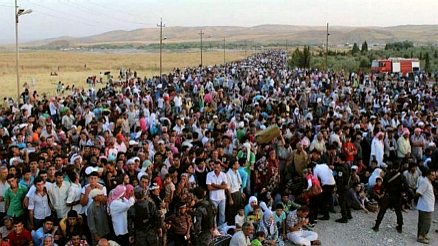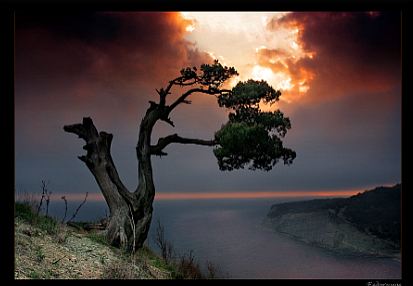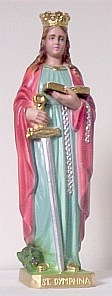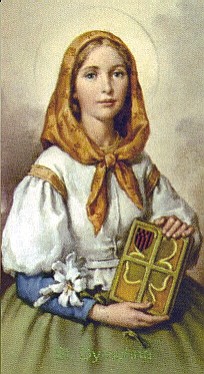Years ago I used to assign Saturday as either Ranting Day or Poetry Day, depending on my mood. Yesterday I was busy with other things, so this week Sunday will have to serve as Poetry Day.
The first of the two poems below was written by Dymphna. It is possibly her greatest poem. She wrote it in the mid-1990s, a few months after her mother died.
Some context is in order: Dymphna’s mother married a man from a wealthy Irish family when she was young. For reasons I won’t go into here, he abandoned his wife and their two children when the latter were still infants. Dymphna’s mother became destitute, and there was no welfare in Florida at that time, so she had to go off to work. For several years the children were placed with various foster families, where conditions ranged from awful to severely abusive.
The priest at Dymphna’s mother’s church eventually helped her place her son and daughter at separate orphanages, one for boys and one for girls, where they were to remain until they were ten or eleven — i.e. old enough to be latchkey kids.
Her poem describes the moment she and her brother were separated from their mother and from each other to be taken to the orphanages. At the time she wrote these verses, her brother had been estranged from his mother and sister for many years, and no one knew where he was. She assumed he was dead, probably of heart disease, since all her mother’s brothers had died that way when they were relatively young. But he wasn’t dead: her cousin was able to locate him, and Dymphna and her brother began an intermittent correspondence that continued until his death last year.
This, then, was her lament:
Lament for My Brother
It was so long ago
Those who stopped my tears
Then, who could not countenance
My guttural sorrow,
Are no doubt dead
Or disarmed by age and distance.
It was so long ago.
Yet my tears are the solvent
Melting the time between here
And then. I am five again.
The little brother being forced
From my arms is four.
We are crying, in the moment before
We learn it is not allowed.
It was so long ago.
Yet the wrench of grief
Tightens my throat now
Brings me to my knees here.
The void where my little brother
Was is hollowed out still;
I cannot fill it.
It was so long ago.
Yet the loss is as current
As the moment here before us.
The gods to whom all moments are one
Who do not understand
My linear “long ago”
Cannot hear my plea
To protect him.
It was so long ago.
He’s no doubt dead by now.
The men in my family die young
Whether they stay or flee.
The women in my family don’t teach
Them how to use their hearts.
The men succumb when
Flight is no longer possible
And they are overtaken
By feeling.
It was so long ago.
The second poem was written in the early 17th century by the great metaphysical poet John Donne. Fifty years ago I had to study the metaphysical poets intensively for A-level English Literature. I don’t know how they do it nowadays, but in those days a student was expected to quote at length from the assigned poetry at the exam, working entirely from memory. Thus, in preparation for the exam I memorized reams of Donne, Herbert, Marvell, Vaughn, Crashaw, etc.
I memorized three of the five stanzas of the following poem, and they’re still here in my head, intact after half a century. However, we were also required to present them in the original 17th-century spelling, and unfortunately that aspect of the task has largely evaporated (although I do remember that “festival” was spelled “festivall”).
In this poem Donne is mourning the death of his wife, for whom he grieved deeply. The conceit is that he is writing it at midnight on St. Lucy’s Day, the shortest day of the year. Dymphna’s case is the opposite: she, too, died at about midnight, but her death was almost exactly at Midsummer’s.
A technical note: the “Goat” to which the lesser (i.e. weaker) sun has run is the constellation Capricorn, in which the winter solstice falls.
Continue reading →
 The journalist Andy Ngo was set upon by Antifa demonstrators in Portland and severely beaten. City police stood down during the incident and did nothing to prevent the beating. Mr. Ngo was hospitalized overnight with bleeding on the brain. Sen. Ted Cruz has called on federal law enforcement to initiate an investigation of the mayor of Portland for the failure of the police to act.
The journalist Andy Ngo was set upon by Antifa demonstrators in Portland and severely beaten. City police stood down during the incident and did nothing to prevent the beating. Mr. Ngo was hospitalized overnight with bleeding on the brain. Sen. Ted Cruz has called on federal law enforcement to initiate an investigation of the mayor of Portland for the failure of the police to act.


 Taken together, the PayPal donations, snail-mail gifts, and donations to the GoFundMe page have now reached and exceeded the costs of Dymphna’s funeral expenses. You needn’t donate to the GoFundMe any longer; everything has been taken care of. As I mentioned earlier, any additional amounts that are specifically earmarked for the funeral will be donated to a reputable local charity that helps victims of sexual assault, including children.
Taken together, the PayPal donations, snail-mail gifts, and donations to the GoFundMe page have now reached and exceeded the costs of Dymphna’s funeral expenses. You needn’t donate to the GoFundMe any longer; everything has been taken care of. As I mentioned earlier, any additional amounts that are specifically earmarked for the funeral will be donated to a reputable local charity that helps victims of sexual assault, including children. Sitting down in this chair and starting to post again is the rough equivalent of the widower showing up at the office on the Monday morning following the funeral. Work is what he needs to keep himself on an even keel. He has a glazed look in his eyes, and his productivity is not up to his usual standards, but his boss (if he has a good one) is patient and understanding.
Sitting down in this chair and starting to post again is the rough equivalent of the widower showing up at the office on the Monday morning following the funeral. Work is what he needs to keep himself on an even keel. He has a glazed look in his eyes, and his productivity is not up to his usual standards, but his boss (if he has a good one) is patient and understanding.
